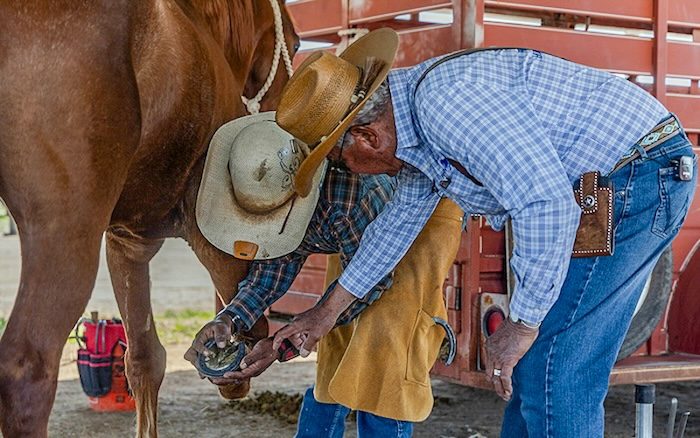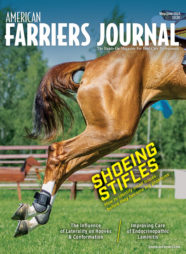George Goode, an 83-year-old member of the Pascua Yaqui Tribe, has been educating young farriers near Tucson, Ariz., for more than 50 years. From 1978-2018, Goode owned and operated the Tucson School of Horseshoeing and founded the Native American Horse Education Foundation (NAHEF) in 2006, a 501(c)3 nonprofit aimed at supporting the well-being of Native Americans and their horses.
“We like our horses, but we don’t know how to love our horses,” Goode tells Cronkite News. “Out of all the years and all the reservations in the United States, there are no programs out there teaching our youth — our people who have horses — how to trim and shoe their horses’ feet correctly.”
Goode brings NAHEF classes to his students on reservations across the country, which can range from 3 days to 12 weeks, and course fees cover the cost of most tools, which Goode provides for students to keep after completion of the course. The mobile courses cover anatomy, basic blacksmithing, trimming, shoeing and corrective shoeing, horse handling and nutrition to meet community needs while providing business opportunities on Indigenous land, according to the foundation website.
“My goal is that if I teach you, I want you to pass it on ...”
Horses are abundant on Indigenous land, but little care is often provided to support horse or hoof health, according to the NAHEF. Proper hoof care in Southwest Native American territory can also cost almost $200 every 8 weeks, according to Goode, which is why he believes it’s important that Indigenous people know how to shoe their horses.
“Horseshoeing is a science, and the natives do not know that,” Goode says. “Somehow we got left out.”
Since starting NAHEF, Goode estimates he’s trained between 120-140 students. One former student, Adrian Morgan, took Goode’s course 20 years ago and now helps Goode part-time to educate another generation of farriers. Morgan, who is a member of the Diné Tribe in northern Arizona, tells Cronkite News that being a farrier kept him employed, happy and healthy.
“When I was learning, it was too much information at one time. I would have never thought of working here as an instructor. But now I’ve got a new career path,” he says.
Shoeing horses has given Morgan a sustainable income since 2004, and Goode aims to keep educating native youth in a trade that is culturally useful and financially beneficial.
“I love teaching. I love the people. I can see the success. My goal is that if I teach you, I want you to pass it on,” Goode says.








Post a comment
Report Abusive Comment